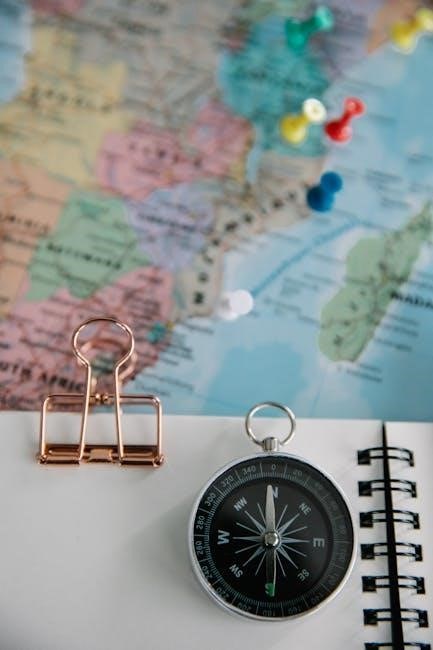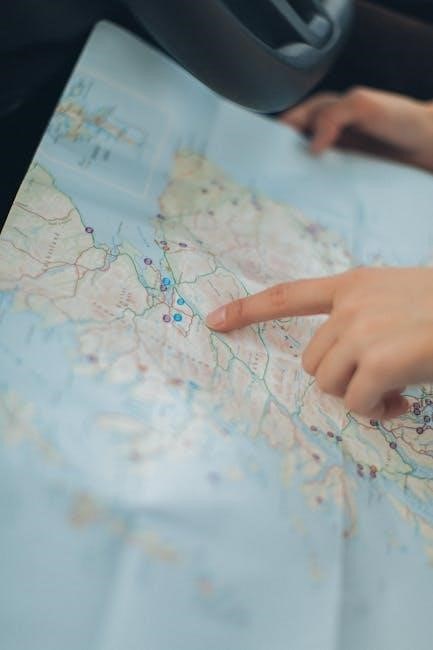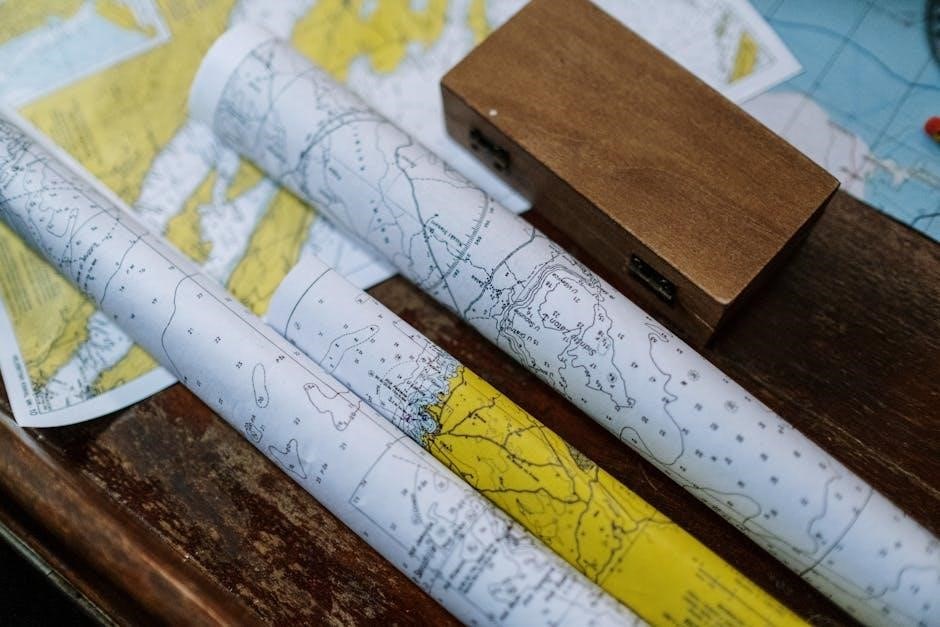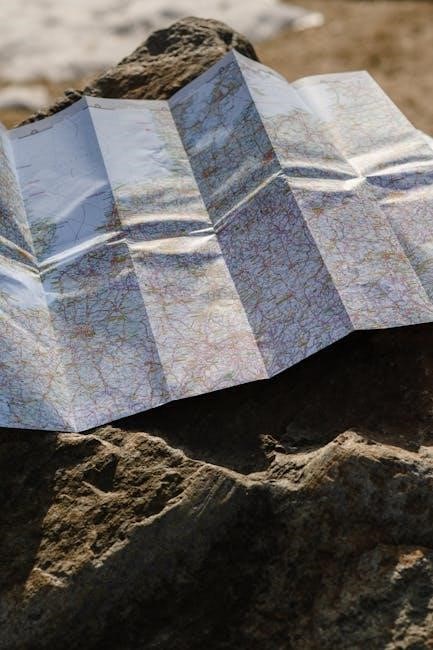Welcome to your comprehensive AQA GCSE Geography revision guide, designed to simplify complex topics with clear notes, case studies, and practice questions. Master physical and human geography with confidence!
Covering natural hazards, ecosystems, urbanisation, and more, this guide offers structured support for exam success. Boost your skills with expert tips and interactive resources.
From fieldwork techniques to exam strategies, this guide ensures you’re fully prepared. Start your revision journey today and achieve your best results in the AQA GCSE Geography exam!
Overview of the AQA Specification
The AQA GCSE Geography specification is structured to explore both physical and human geography, providing a balanced understanding of global issues; Key topics include natural hazards, ecosystems, urbanisation, and globalisation, ensuring comprehensive coverage of essential themes.
The specification is divided into three main papers, each focusing on distinct areas: physical geography, human geography, and geographical skills. It also integrates fieldwork and investigative techniques, preparing students for real-world applications of geographical knowledge.
With a strong emphasis on case studies and practical skills, the AQA specification equips students to analyse complex geographical phenomena critically. It encourages the development of investigative, analytical, and problem-solving abilities, essential for success in the exam and beyond.
Key Components of the Revision Guide
This AQA GCSE Geography revision guide is packed with clear study notes, detailed case studies, and practice questions to help students master every topic. Superb examples and diagrams break down complex concepts, making them easier to understand and remember.
The guide includes exam-style questions and a dedicated section on geographical skills, ensuring students are well-prepared for all aspects of the exam. A glossary at the back helps reinforce key terminology, while tips for tackling extended questions and fieldwork skills provide additional support.
Whether focusing on physical or human geography, this guide offers a structured approach to revision, helping students achieve their best results with confidence and clarity.

Physical Geography
Physical geography explores Earth’s natural systems, including landforms, climate, and processes shaping the environment. Key topics include natural hazards, weathering, and ecosystems, crucial for understanding environmental dynamics and exam success.
Natural Hazards
Natural hazards, such as earthquakes and volcanic eruptions, are key topics in AQA GCSE Geography. Understanding processes like plate tectonics and the Moment Magnitude Scale is crucial. Earthquakes occur when tectonic plates jerk past each other, releasing energy as seismic waves. The focus depth determines the impact, with shallow earthquakes causing more damage. Volcanic activity, landforms, and associated risks are also covered. Case studies, such as the 2015 Nepal earthquake, highlight human and environmental consequences. Effective revision involves analyzing causes, effects, and mitigation strategies. Practice questions and past papers help refine understanding of these complex processes, ensuring exam readiness and a deeper grasp of natural hazards.
Weathering and Erosion
Weathering and erosion are fundamental processes shaping Earth’s landscape. Mechanical weathering breaks rocks into smaller fragments through freeze-thaw action, while chemical weathering alters rock composition, such as carbonation. Erosion involves the transportation of weathered materials by agents like water, wind, and ice. Key examples include coastal cliffs worn by wave action and river valleys carved by flowing water. Understanding these processes is vital for analyzing landforms and landscape changes. Revision strategies include creating diagrams to visualize processes and studying case studies, such as river erosion in meandering streams. Practice questions on these topics will help refine your understanding and prepare you for exam success in AQA GCSE Geography.
Ecosystems and Biomes
Ecosystems and biomes are crucial topics in AQA GCSE Geography, focusing on interactions between living organisms and their environments. Ecosystems involve food chains, nutrient cycles, and energy flows, while biomes are large, naturally occurring communities of plants and animals. Key biomes include tropical rainforests, coral reefs, and arctic tundras. Understanding adaptations of species to their environments is essential. Human impacts, such as deforestation and climate change, disrupt these systems. Revision involves creating detailed diagrams of energy pyramids and trophic levels. Case studies, like the Amazon rainforest, highlight biodiversity and ecosystem services. Practice questions often assess the balance between human activity and environmental conservation, ensuring comprehensive understanding for exam success.

Human Geography
Explore the dynamics of human populations, migration, urbanisation, and economic systems. Understand globalisation, development, and human-environment interactions. Develop skills in data analysis and case study evaluation for exam success.
Population and Migration
Understanding population dynamics and migration patterns is crucial for AQA GCSE Geography. Explore how factors like birth rates, death rates, and life expectancy shape population structures. Analyze push-pull factors driving migration, such as economic opportunities, conflict, or environmental changes. Study global migration trends and their socio-economic impacts on origin and destination regions. Use case studies to evaluate how migration influencesurbanisation and cultural diversity. Examine the role of government policies and international agreements in managing migration flows. Connect these concepts to the demographic transition model to better understand population changes over time and their implications for sustainable development.
Urbanisation and Development
Urbanisation and development are key themes in AQA GCSE Geography, focusing on how cities grow and the challenges they face. Study the causes of urbanisation, such as rural-urban migration driven by economic opportunities. Explore the positive impacts, like increased employment and innovation, alongside negative issues like overcrowding, pollution, and inequality. Analyze strategies for sustainable urban development, including urban planning and infrastructure improvements. Investigate case studies of rapidly growing cities and their responses to urbanisation. Understand the role of governments and international organisations in addressing urban challenges and promoting inclusive growth. Connect these concepts to global development goals and the importance of creating livable cities for the future.
Economic Systems and Globalisation
Economic systems and globalisation are central to understanding how economies function and interact globally. Study the differences between command, market, and mixed economies, and how they allocate resources. Explore globalisation’s impact on trade, culture, and economic interdependence. Analyze how multinational corporations (MNCs) and outsourcing shape global production and employment. Investigate the benefits, such as economic growth and technological advancement, alongside challenges like inequality and exploitation. Examine the role of global institutions like the World Trade Organisation (WTO) and International Monetary Fund (IMF) in regulating economic activities. Understand how globalisation influences local economies and cultures, leading to debates on its long-term sustainability and ethical implications.

Geographical Skills
Geographical skills are essential for analysing and interpreting data. Master map skills, graphical techniques, and fieldwork methods. Develop practical abilities to collect and analyse data effectively for exam success.
Map Skills and Cartography
Mastering map skills is crucial for AQA GCSE Geography. Learn to interpret and annotate Ordnance Survey maps, understanding symbols, scales, and grid references. Practice identifying landforms, rivers, and urban features. Develop cartography skills by creating and analysing thematic maps, such as population density or climate zones. Understand how to use GIS and digital mapping tools to enhance your geographical analysis. Revision guides and online resources provide interactive exercises to improve your map-reading abilities. Focus on applying these skills to real-world scenarios, such as analysing flood-risk zones or urban expansion patterns. Regular practice with past paper questions will help you excel in this key area of the curriculum.

Graphical Skills and Data Analysis
Developing graphical skills and data analysis is essential for AQA GCSE Geography. Learn to interpret and create a variety of graphs, including line graphs, bar charts, and pie charts. Understand how to extract and present data effectively, using tools like scatter graphs to identify correlations. Practice analysing and interpreting geographical data, such as population trends or climate statistics. Revision guides offer exercises to improve your ability to identify patterns, trends, and anomalies. Focus on applying these skills to exam-style questions, where you may be asked to describe or explain data. Regular practice with past papers will help you build confidence in your analytical and presentation skills.
Fieldwork and Investigation Techniques
Fieldwork and investigation techniques are crucial for AQA GCSE Geography, enabling students to collect and analyse primary data. Learn how to conduct effective fieldwork, including sampling methods, measuring techniques, and data recording. Understand how to use equipment like clinometers, pH meters, and GPS devices. Revision guides provide tips on designing investigations, ensuring reliability and validity. Practice interpreting data from fieldwork, such as river studies or urban surveys. Develop skills in presenting findings through graphs and reports. Familiarise yourself with exam questions that test fieldwork skills, such as data analysis and evaluation of methodologies. Past papers and practice exercises will help refine your ability to apply these techniques confidently.

Revision Strategies
Develop effective revision strategies for AQA GCSE Geography success. Focus on time management, active learning, and structured plans. Utilize revision guides, online tools, and practice resources effectively.
Effective Note-Taking Methods
Effective note-taking is essential for successful revision in AQA GCSE Geography. Create personal, concise notes using bullet points and headings to organize information clearly. Highlight key terms and concepts to focus on critical areas. Use mind maps or diagrams to visually connect ideas, especially for topics like ecosystems or urbanisation. Review and condense notes regularly to reinforce memory. Stick key notes in visible places, such as on a wall or fridge, to revise passively. Additionally, use flashcards for quick recall of definitions and case studies. Prioritise active note-taking over passive copying, ensuring you understand and summarise the content in your own words. This approach enhances retention and exam performance.
Using Past Papers for Practice
Practising with past papers is a vital revision strategy for AQA GCSE Geography. Regularly attempting exam-style questions helps familiarize yourself with command words, question formats, and time management. Start by tackling questions on topics you’ve recently revised, then move to mixed-topic papers. Use a timer to simulate exam conditions, ensuring you adhere to the allocated time per question. Review your answers using the mark scheme to identify strengths and areas for improvement. Focus on understanding where you went wrong and revise those topics thoroughly. Past papers also reveal recurring themes and question types, allowing you to target your study effectively. Consistent practice builds confidence and exam readiness.
Time Management for Revision
Effective time management is crucial for successful AQA GCSE Geography revision. Create a detailed study plan, breaking your syllabus into manageable chunks and allocating specific times for each topic. Prioritize weaker areas to ensure balanced progress. Set realistic daily goals and stick to them consistently. Use timers during practice sessions to simulate exam conditions and improve speed; Regularly review your progress to adjust your plan as needed. Avoid cramming by spacing out your study sessions, allowing time for information to consolidate. Consistent, focused revision is key to retaining knowledge and performing well in the exam. Stay adaptable and maintain a steady pace to achieve your goals.

Exam Preparation
Mastering exam technique is vital for AQA GCSE Geography success. Focus on understanding command words, practicing past papers, and refining strategies for extended questions and case studies.
Understanding Command Words
Command words are essential for interpreting exam questions effectively. They guide how you should respond, such as explain, describe, or evaluate. Understanding these words ensures your answers meet the question’s requirements.
Familiarize yourself with common command words in AQA GCSE Geography. For example, explain requires a detailed account, while evaluate asks for an assessment of pros and cons. Practicing past papers helps you recognize these words in context.
Use command words to structure your answers. Highlight them in questions and plan your response around them. This technique improves clarity and ensures you address all parts of the question effectively.
Answering Extended Questions
Mastering extended questions is crucial for success in AQA GCSE Geography exams. These questions require detailed, structured responses, often involving analysis, evaluation, or synthesis of information. Start by thoroughly reading the question to identify key command words and requirements.
Plan your answer using the DEMI method: Define the question, Explain your approach, Monitor progress, and Illustrate with examples. Use case studies and geographical concepts to support your points, ensuring relevance and depth.
Allocate time wisely, spending a few minutes planning and the majority writing. Address each part of the question clearly, using bullet points or paragraphs as appropriate. Practice past papers to refine your technique and build confidence in tackling complex questions effectively.
Geographical Enquiry and Fieldwork
Geographical enquiry and fieldwork are essential components of the AQA GCSE Geography curriculum. Fieldwork involves collecting primary data through observations, measurements, and surveys to investigate geographical phenomena. Students learn to design hypotheses, collect data, and analyze results to draw meaningful conclusions.
Key fieldwork techniques include mapping, sampling strategies, and the use of GIS tools. Practicing these skills helps prepare for the exam, as they are often assessed in extended questions and case studies. Reviewing past papers and pre-release booklets can provide insights into how to approach fieldwork-based questions effectively. Mastering these skills enhances your ability to evaluate evidence and apply geographical concepts to real-world scenarios. Regular practice and revision are vital to excel in this area of the exam.

Case Studies and Examples
The Demographic Transition Model explains population change over time, divided into five stages. Stage one features high birth and death rates, resulting in stable populations. Stage two sees declining death rates due to improvements in healthcare and sanitation, leading to rapid population growth. Stage three shows declining birth rates as urbanization and family planning increase. Stage four has low birth and death rates, stabilizing population growth. Stage five, observed in some countries, shows declining populations due to low birth rates. This model is essential for understanding population dynamics and development patterns, making it a key topic in AQA GCSE Geography exams and case studies.
Extreme Weather Events
Extreme weather events, such as hurricanes, floods, and heatwaves, are critical for AQA GCSE Geography studies. These events are often linked to climate change, causing significant socio-economic impacts. For example, earthquakes, like the 2015 Nepal earthquake (magnitude 7), demonstrate the devastating effects of natural hazards. The Moment Magnitude Scale highlights that a magnitude 7 earthquake is 10 times more powerful than a 6. Such events emphasize the importance of understanding hazard management and vulnerability. Students should analyze case studies, such as recent UK extreme weather events, to assess socio-economic effects. This topic bridges physical and human geography, offering insights into disaster response and mitigation strategies, essential for exam success and real-world applications.
Urban Growth and Development
Urban growth and development are key topics in AQA GCSE Geography, focusing on how cities expand and the challenges they face. Rapid urbanisation, driven by migration and economic opportunities, leads to urban sprawl and megacities. This growth often results in increased pollution, overcrowding, and resource demands. Case studies, such as London or Tokyo, highlight urban planning strategies and sustainable development efforts. Understanding urban hierarchies and the role of cities as economic hubs is crucial. This section explores the benefits and drawbacks of urbanisation, providing insights into how urban areas shape societies and economies, preparing students for exam questions on urban challenges and solutions.

Practice Questions and Feedback
Enhance your exam skills with practice questions and detailed feedback. Use past papers and interactive quizzes to test knowledge and improve essay-writing abilities for confident revision.
Mock Exam Scenarios
Mock exams are a crucial part of your revision process, allowing you to simulate real exam conditions and identify areas for improvement. Use past papers to create timed scenarios, ensuring you practice under pressure. This helps you refine your time management skills and build confidence in answering questions within the allocated time. Mock exams also enable you to apply your knowledge to unseen questions, enhancing your ability to structure responses effectively. Reviewing your performance post-exam is essential, as it highlights strengths and weaknesses, guiding your future revision focus. Treat these scenarios as opportunities to refine your exam strategy and reduce anxiety, ensuring you’re fully prepared for the actual test.
Reviewing and Learning from Mistakes
Reviewing and learning from mistakes is a vital part of the revision process. After completing practice questions or mock exams, identify areas where you struggled and understand why errors occurred. Use revision notes to clarify concepts and address gaps in your knowledge. Self-assessment helps you target weak points effectively. For example, if you consistently misinterpret command words, focus on understanding their meanings and how they apply to questions. Creating a list of common mistakes and revisiting them regularly ensures you don’t repeat them in the actual exam. This reflective approach strengthens your understanding and builds confidence, enabling you to perform at your best.
Improving Essay-Writing Skills
Improving essay-writing skills is essential for success in AQA GCSE Geography. Start by understanding command words like “explain,” “evaluate,” and “compare,” as they guide your response. Plan your essays using the PEEL structure (Point, Evidence, Explanation, Link) to ensure clarity and coherence. Practice answering past paper questions, focusing on concise and relevant points. Use case studies to support your arguments, demonstrating a deep understanding of geographical concepts. Regularly review and refine your essays, seeking feedback from teachers or peers. Over time, this practice will enhance your ability to articulate ideas effectively, boosting your grades and confidence in exams.

Additional Resources
Enhance your revision with CGP guides, BBC Bitesize, and online platforms offering interactive learning. Utilize teacher support and peer networks for tailored guidance and exam success strategies;
Recommended Revision Guides
CGP Revision Guides are highly recommended for AQA GCSE Geography, offering clear notes and exam-style questions; Their structured approach covers all specification topics, ensuring comprehensive preparation.
These guides include detailed case studies, practice questions, and expert tips. They are designed to build confidence and skills, making them an essential resource for exam success.
Additionally, CGP provides accompanying online resources, such as interactive quizzes and video tutorials, to enhance learning and reinforce key concepts.
With CGP, students can systematically review every topic, ensuring they are well-prepared for both physical and human geography sections of the AQA exam.
Investing in these guides is a proven way to achieve top grades in GCSE Geography.
Online Platforms for Interactive Learning
BBC Bitesize is a top choice for AQA GCSE Geography students, offering interactive quizzes, video tutorials, and detailed study guides. Its structured resources cover all specification topics, making it ideal for revision.
CGP also provides online resources, including practice questions and interactive revision tools. These platforms enhance learning by providing engaging ways to grasp complex concepts and prepare for exams.
Additionally, websites like Kerboodle and MyGeography offer tailored resources, such as interactive maps and case study analyses. These tools help students develop practical skills and deepen their understanding of key topics.
Online platforms are essential for modern revision, offering flexibility and interactivity to support AQA GCSE Geography students in achieving exam success.
Teacher and Peer Support Networks
Teachers play a crucial role in guiding your revision journey, offering tailored advice and resources. Regular interactions with teachers help clarify doubts and refine study strategies. Peer support networks, such as study groups, foster collaborative learning and shared insights. Seek feedback from teachers and engage in group discussions to deepen your understanding of complex topics. Online forums and school platforms also connect students and educators, enabling interactive learning and problem-solving. Building a strong support network enhances your revision experience and helps you stay motivated throughout your AQA GCSE Geography preparation.
This revision guide provides a structured approach to mastering AQA GCSE Geography, ensuring confidence and readiness for exams. Stay motivated, use resources effectively, and aim for success!
Final Tips for Success
To excel in your AQA GCSE Geography exam, stay organized and focused. Regularly review your notes and practice past papers to identify strengths and weaknesses. Understand command words to tailor your answers effectively.
Engage with case studies and real-world examples to deepen your understanding. Allocate time for fieldwork skills and geographical enquiries, as they are crucial for high marks.
Stay motivated by setting achievable goals and celebrating progress. Seek feedback from teachers and peers to refine your essay-writing skills.
Lastly, maintain a healthy study-life balance to avoid burnout. With consistent effort and smart revision, you’ll be well-prepared to achieve your best results!
Staying Motivated and Confident
Maintaining motivation and confidence is key to successful revision. Set realistic goals and celebrate small achievements to keep morale high. Remind yourself of your progress and why you’re working hard.
Surround yourself with a supportive network, including teachers and peers, to share tips and stay encouraged. Break tasks into manageable parts to avoid feeling overwhelmed.
Engage with interactive resources like videos and quizzes to make revision engaging. Stay positive and focus on improvement rather than perfection. With dedication and belief in your abilities, you’ll approach exams with confidence!
